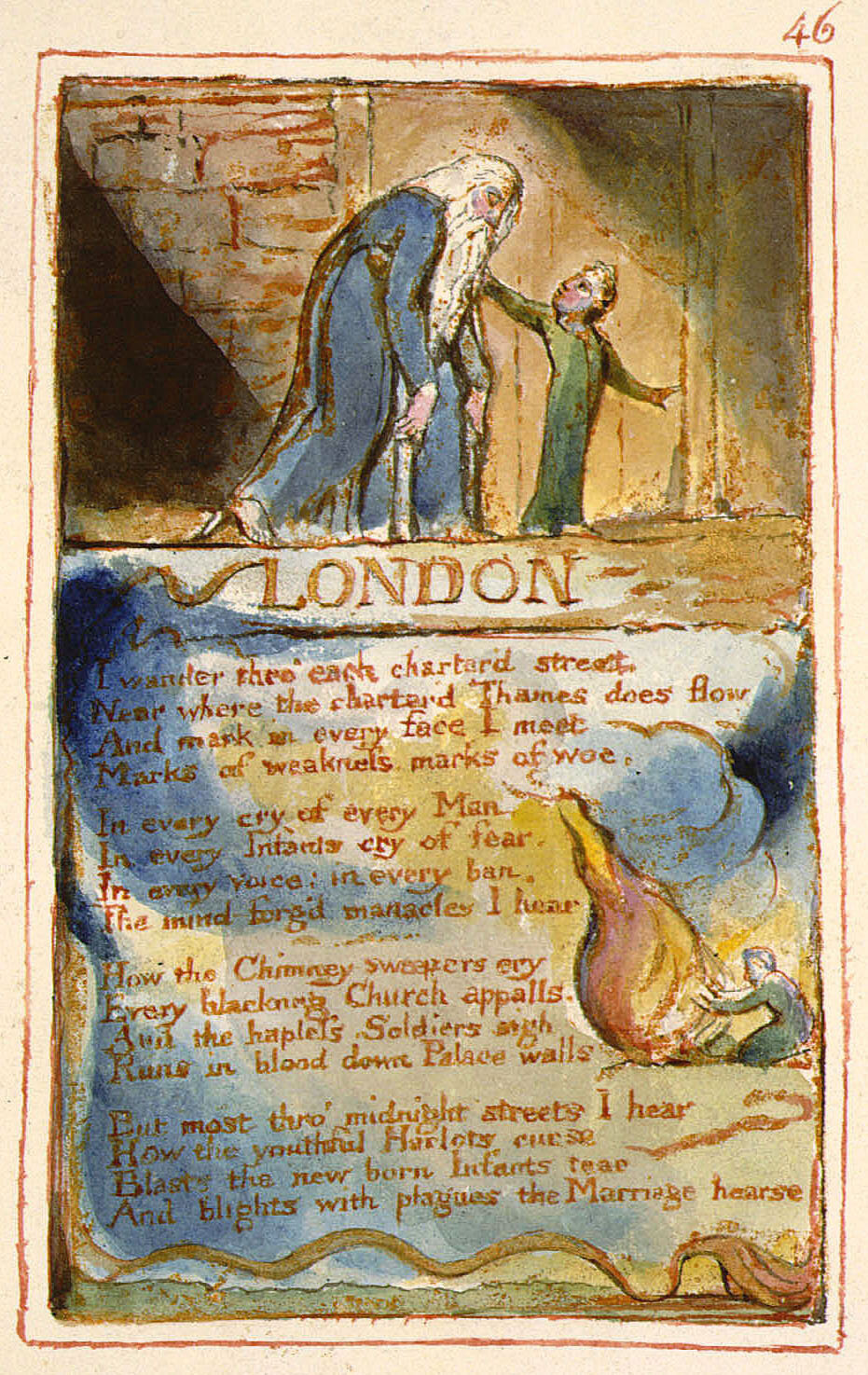LONDON
LONDON
I wander thro' each charter'd street,
Near where the charter'd Thames does flow.
And mark in every face I meet
Marks of weakness, marks of woe.
In every cry of every Man,
In every Infants cry of fear,
In every voice: in every ban,
The mind-forg'd manacles I hear
How the Chimney-sweepers cry
Every blackning Church appalls,
And the hapless Soldiers sigh
Runs in blood down Palace walls
But most thro' midnight streets I hear
How the youthful Harlots curse
Blasts the new-born Infants tear
And blights with plagues the Marriage hearse
- William Blake
There is no time like these present times of isolation and unemployment to return to this long-neglected blogging project about these songs. For those of us who are fortunate enough to be in good health, one of the silver linings of this unexpected time on our hands is the opportunity to catch up on all the projects which have fallen by the wayside during the harried times of normal life…
R. VAUGHAN WILLIAMS: London from Ten Blake Songs
Blake’s poem, London, doesn’t really paint the most beautiful nor flattering picture of urban life, and although we have certainly made progress in regards to the hygiene and health of our cities over the centuries, our current predicament illustrates just how short a distance we have come since Blake published this poem in 1794. Stories of navy sailors being trapped on a ship infected with the novel coronavirus and their captain being forced to throw himself on his sword in a desperate attempt to get them off the ship don’t seem so far from "the hapless Soldiers sigh” running “in blood down Palace walls”.
I’ve actually been thinking about this post for a very long time, and for much of that time, I had planned to write about our homelessness problems here in San Francisco. Our greatest issue is arguably the suffering of the great many homeless people who live here. In our fair city, it is not uncommon to see “marks of weakness” and “marks of woe” in the faces one encounters in the street. As I was planning this post, I was going to highlight the excellent coverage the San Francisco Chronicle has been doing on the many complexities of this issue over the past four years. I was also going to write a bit about my biggest pet peeve about visitors to San Francisco, when they airily observe: “oh, there are so many homeless here”, with a tone that acknowledges it merely as blight, and as if their own communities don’t also grapple with this same issue. Yes, we do have many homeless here. Yes, California is home to nearly one quarter of the US homeless population. Our year-round temperate weather combined with well-intentioned muncipal and state laws that protect the homeless also make the issue a very visible one - more visible than it is in other communities. Just because you don’t see the homeless in the communities where you live does not mean that they are not your neighbors, as well.
While this crisis has resulted in some extra time for me to return to long-neglected projects like this one, it’s also brought into sharp relief how our institutions of power are rotting from the inside, and failing (and at worst, ignoring) the needs of the most vulnerable constituents which they serve. While I know there is debate about Blake’s intentions behind his use of the word “charter’d”, it’s difficult not to read this as “state controlled”. One of the dominant themes the poem explores is institutions of power and their neglect of the poor, who are utterly powerless. In Blake’s poem, the state is so completely in charge, it even controls the river which runs through the city. Blake’s poem doesn’t sound too unlike the presidential campaigns of today.
One of the aspects of this current moment in history is that this time of enforced stillness is compelling a spiritual reckoning. With the world’s norms suspended as we attempt to curb the spread of this disease, it brings a lot of those conventions into question. One of these is the idea that throwing money at a problem will solve it. In San Francisco alone, we spend millions upon millions of dollars on homelessness each year. Yet, year after year, visitors continue to make their nonchalant observations about the number of homeless here. Likewise, while a stimulus check of $1200 is helpful and welcome, it’s not enough to solve the issues of exponentially increased unemployment and the astronomic costs of health care in the midst of this crisis.
What is needed beyond simple cash is perhaps a revolution of thinking more than anything else. Blake is apt in his observation that the manacles which hold us back as a society are not real - they are “mind-forged”. Hopefully one of the positive outcomes from this crisis will be a greater understanding of the suffering and struggles of our fellow human, as well as an increased empathy, compassion and care for each other. Armed with those tools, perhaps we can forge better systems that take better care of everyone and make a bit more progress from Blake’s London of 225 years ago.
This project is a fiscally sponsored project of FRACTURED ATLAS, and was made possible in part through a grant from SAN FRANCISCO FRIENDS OF CHAMBER MUSIC / INTERMUSIC SF.
To find our more information and to make a TAX-DEDUCTIBLE donation to support the continuation of this project please visit: https://fundraising.fracturedatlas.org/nicholas-phan-recording-projects
